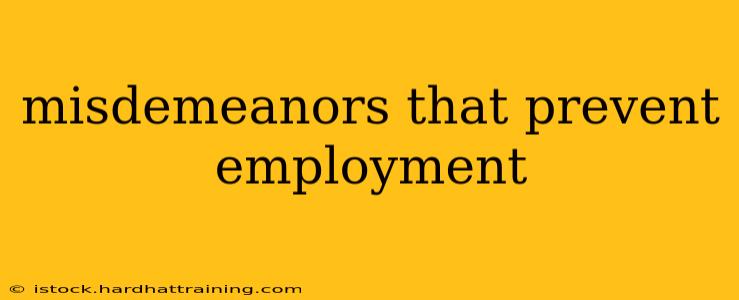Finding a job can be challenging, and a criminal record can make the process even more difficult. While a felony conviction often significantly impacts employment prospects, certain misdemeanors can also pose substantial obstacles. This guide explores several misdemeanors that frequently prevent individuals from securing employment and offers strategies for navigating this complex landscape. Understanding the potential impact of your record is crucial for proactive planning and mitigation.
Types of Misdemeanors that Often Impact Employment
The specific impact of a misdemeanor on your employment prospects depends on several factors, including the nature of the offense, the employer, and the industry. However, some misdemeanors consistently present greater challenges than others. These include:
1. Theft-Related Misdemeanors:
- Shoplifting: Even minor shoplifting charges can raise serious red flags for potential employers, particularly in retail, finance, and security-related positions. Employers often view this as a breach of trust and a sign of dishonesty.
- Petty Theft: Similar to shoplifting, petty theft convictions demonstrate a disregard for property rights and can significantly hinder employment opportunities.
2. Misdemeanors Involving Violence or Assault:
- Simple Assault: While less severe than felonies involving assault, even simple assault convictions can disqualify candidates from jobs requiring interaction with the public or those involving a level of responsibility for the safety of others.
- Domestic Violence: A domestic violence misdemeanor can have particularly severe consequences, often leading to automatic disqualification from numerous employment opportunities, especially those involving children or vulnerable populations.
3. Drug-Related Misdemeanors:
- Possession of Controlled Substances: Depending on the substance and the state laws, possession of even small amounts of drugs can result in a misdemeanor conviction. This can negatively impact job prospects, particularly in fields with strict drug-testing policies.
- Drug Paraphernalia Possession: Even possession of paraphernalia can be a misdemeanor, and employers may interpret this as a sign of ongoing drug use, leading to rejection.
4. Misdemeanors Involving Fraud or Deception:
- Check Fraud: This misdemeanor demonstrates a lack of financial responsibility and trustworthiness, making it a significant hurdle in securing employment, especially in financial or accounting roles.
- Identity Theft (Minor Charges): While major identity theft is usually a felony, minor charges related to identity theft can still negatively affect employment opportunities.
5. Driving-Related Misdemeanors:
- DUI/DWI (First Offense): Although a first offense might be a misdemeanor, it can still severely impact employment prospects, especially in jobs requiring a driver's license or those with safety-sensitive operations. Many employers conduct background checks that reveal DUI/DWI convictions.
- Reckless Driving: Similar to DUI/DWI, reckless driving convictions show a disregard for safety and can prevent employment in positions requiring a driver's license or involving responsibility for the safety of others.
Strategies for Mitigating the Impact of Misdemeanors on Employment
Having a misdemeanor on your record doesn't automatically preclude you from finding employment. However, understanding how to navigate the hiring process is critical. Here are some strategies:
- Be Proactive and Honest: Disclose your record honestly and proactively, rather than waiting for the employer to discover it during a background check. A forthright approach can demonstrate responsibility and remorse.
- Highlight Positive Attributes: Focus on your skills, experience, and positive attributes. Showcase your rehabilitation and any steps taken to address the underlying issues that led to the misdemeanor.
- Seek Legal Advice: A lawyer can advise you on how to best present your record to potential employers and navigate the legal complexities.
- Gain Relevant Experience: Volunteer work, further education, and relevant experience can help offset the negative impact of a misdemeanor.
- Consider Expungement or Sealing: Depending on your state laws, you may be eligible for expungement or sealing of your record, which can significantly improve your employment prospects.
Conclusion
While a misdemeanor conviction can impact employment opportunities, it's not an insurmountable barrier. By understanding the types of misdemeanors that commonly affect employment, and by employing the strategies outlined above, individuals with misdemeanor records can significantly increase their chances of securing meaningful and fulfilling employment. Remember, proactive planning, honesty, and a focus on personal growth are key to overcoming this challenge.
